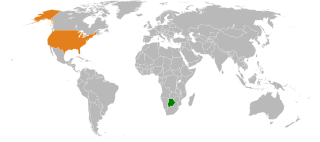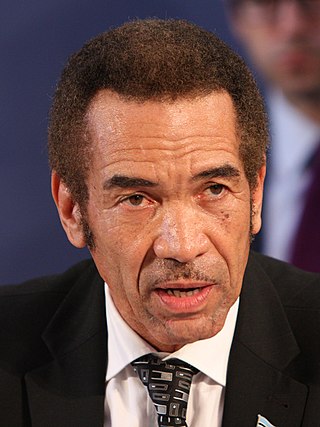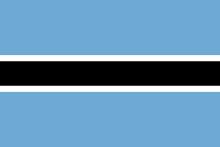
Botswana, officially the Republic of Botswana, is a landlocked country in Southern Africa. Botswana is topographically flat, with approximately 70 percent of its territory being the Kalahari Desert. It is bordered by South Africa to the south and southeast, Namibia to the west and north, and Zimbabwe to the northeast. It is connected by the Kazungula Bridge to Zambia, across the world's shortest border between two countries.
The Batswana, a term also used to denote all citizens of Botswana, refers to the country's major ethnic group. Prior to European contact, the Batswana lived as herders and farmers under tribal rule.

The economy of Botswana is currently one of the world's fastest growing economies, averaging about 5% per annum over the past decade. Growth in private sector employment averaged about 10% per annum during the first 30 years of the country's independence. After a period of stagnation at the turn of the 21st century, Botswana's economy registered strong levels of growth, with GDP growth exceeding 6–7% targets. Botswana has been praised by the African Development Bank for sustaining one of the world's longest economic booms. Economic growth since the late 1960s has been on par with some of Asia's largest economies. The government has consistently maintained budget surpluses and has extensive foreign-exchange reserves.

Tswana, also known by its native name Setswana, and previously spelled Sechuana in English, is a Bantu language spoken in and indigenous to Southern Africa by about 8.2 million people. It is closely related to the Northern Sotho and Southern Sotho languages, as well as the Kgalagadi language and the Lozi language.

Gaborone is the capital and largest city of Botswana with a population of 246,325 based on the 2022 census, about 10% of the total population of Botswana. Its agglomeration is home to 421,907 inhabitants at the 2011 census.

The president of the Republic of Botswana is the head of state and the head of government of Botswana, as well as the commander-in-chief of the armed forces, according to the Constitution of Botswana.

The Bechuanaland Protectorate was a protectorate established on 31 March 1885 in Southern Africa by the United Kingdom. It became the Republic of Botswana on 30 September 1966.

Botswana is divided into 10 administrative districts, two cities, five towns and 11 sub districts. These are administered by 16 local authorities.

The coat of arms of Botswana was adopted on 25 January 1966. The centre shield is supported by two zebras. The shape of the shield is that of traditional shields found in Southern Africa. On the top portion of the shield are three cogwheels that represent industry.
Air Botswana Corporation is Botswana's state-owned national flag carrier, with its headquarters located in Gaborone. It operates scheduled domestic and regional flights from its main base at Sir Seretse Khama International Airport. Air Botswana has been loss-making for several years, and there have been various attempts to privatise the company, and frequent changes to the corporation's management and board, so far without reducing the losses.

The Botswana national football team was founded in 1970 to represent Botswana in association football and is governed by the Botswana Football Association (BFA). It qualified for the 2012 Africa Cup of Nations.

Education in Botswana is provided by public schools and private schools. Education in Botswana is governed by the Ministries of Basic Education. and Tertiary, Research Science and Technology Among sub-Saharan African countries, Botswana has one of the highest literacy rates. According to The World Factbook - Central Intelligence Agency as of 2015, 88.5% of the population age 15 and over can read and write in Botswana were respectively literate.

The cuisine of Botswana is unique but shares some characteristics with other cuisines of Southern Africa. Examples of Setswana food include pap, samp, vetkoek, bogobe and mophane worms. A food unique to Botswana is seswaa, salted mashed-up meat.

The Botswana Football Association (BFA) is the governing body of association football in Botswana, and controls the national football team. It is an affiliate of FIFA, CAF and the COSAFA.

Botswana–United States relations are the bilateral relations between Botswana and the United States.

Botswana passports are issued by the Passport Division of the Department of Immigration and Citizenship in the Ministry of Nationality, Immigration And Gender Affairs to citizens of Botswana for international travel.

Seretse Khama Ian Khama is a Botswana politician and former military officer who was the fourth President of the Republic of Botswana from 1 April 2008 to 1 April 2018. After serving as Commander of the Botswana Defence Force, he entered politics and was Vice-President of Botswana from 1998 to 2008, then succeeded Festus Mogae as President on 1 April 2008. He won a full term in the 2009 election and was re-elected in October 2014.

Visitors to Botswana require a visa unless they come from one of the visa exempt countries.

Mokgweetsi Eric Keabetswe Masisi is a Botswana politician who is the fifth and current President of Botswana, serving since 2018. He served as the 8th Vice President of Botswana from 12 November 2014 to 1 April 2018. He was a Member of Parliament in the National Assembly for the Moshupa-Manyana constituency from 2009 to 2018.
COVID-19 vaccination in Botswana is an ongoing immunisation campaign against severe acute respiratory syndrome coronavirus 2 (SARS-CoV-2), the virus that causes coronavirus disease 2019 (COVID-19), in response to the ongoing pandemic in the country.













